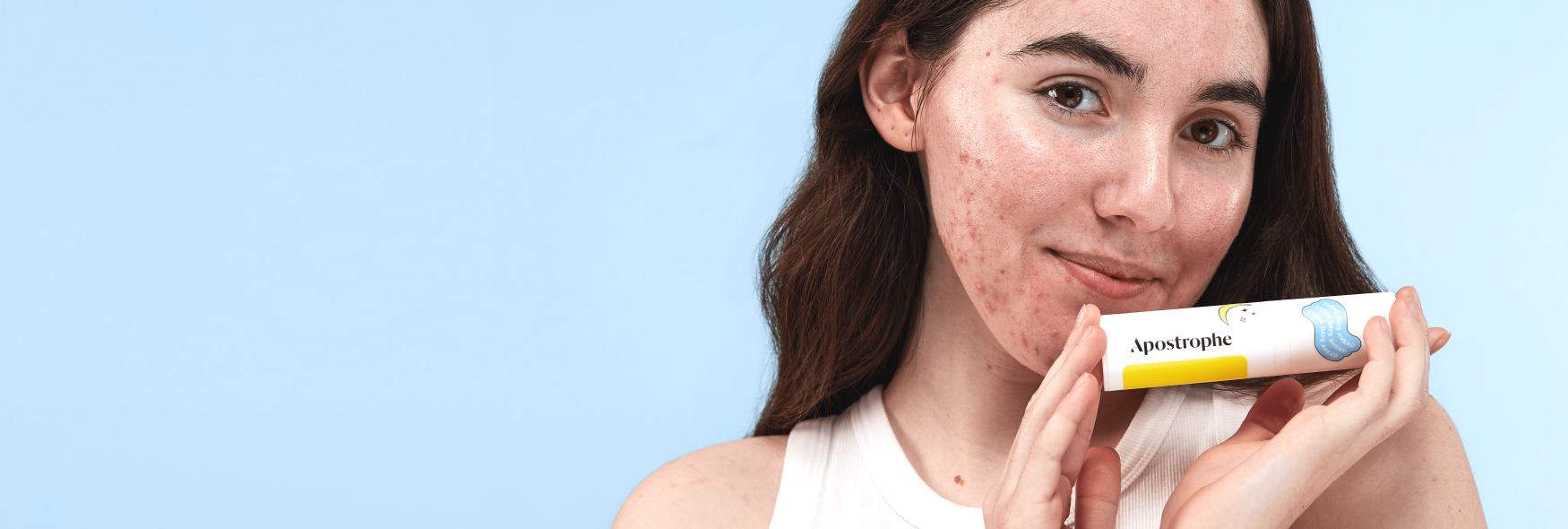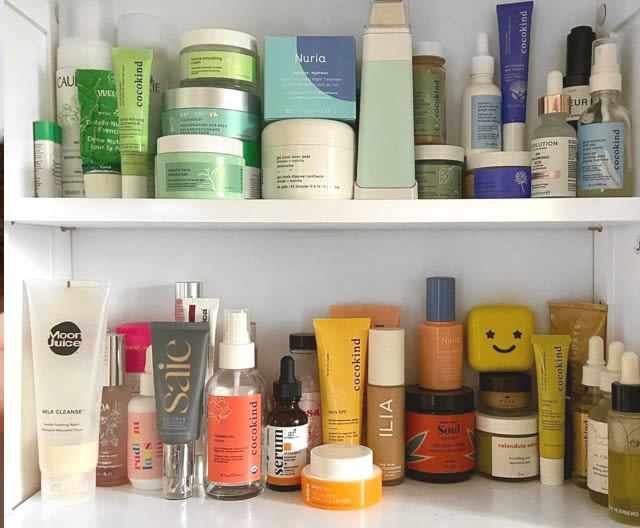General
What causes acne in adults (and what to do)


SHARE
General
What causes acne in adults (and what to do)
Medically reviewed by Kristin Hall, FNP
Written by Apostrophe Team
Last updated 9/1/2023
You know what acne is. You likely had it as a teenager — most of us did, to some extent. But when you struggle with adult acne, it can be particularly difficult.
It’s embarrassing, painful, and can feel just plain gross. It forces you to spend more money and effort than you’d like to treat it, to wear maybe more makeup than you otherwise would, and maybe even to cancel plans in the midst of a particularly bad breakout. There��’s really nothing to like about this skin condition.
Figuring out how to clear up your skin begins with understanding what’s causing your breakouts. Rather than throwing everything labeled “anti-acne” at your face, really knowing how acne works can lead you toward more effective acne treatments and long-lasting solutions.
How Acne Develops
Acne vulgaris is caused by the interaction of skin oil (sebum), dead skin cells and bacteria. How it all works:
Your skin produces oil to stay supple and moisturized. That oil is released after traveling from your oil glands through your hair follicles and out your pores. Your skin also sheds dead skin cells on a regular basis.
But when those dead skin cells build up and block a pore, they prevent the oil from leaving. That trapped oil mixes with bacteria, and boom! A pimple develops.
Repeat across your face, back, chest, or any number of locations on your body, and you have acne.
Not all acne is the same — it can be “graded” by how severe it is: mild, moderate, or severe.
This grading is based not only on the number of lesions you deal with at any given time, but the type of acne lesions you encounter.
Closed comedones (whiteheads) and open comedones (blackheads) are the most basic forms of acne lesions. Papules are small, pink bumps. Pustules are filled with pus and red at the base. Nodules are hard, large, and deep pimples. And cysts are pus-filled, painful pimples that scar.
Even though they’re different, they’re all types of inflammatory acne lesions.
So what makes one person more likely to develop acne? Or what makes you more likely to develop it at certain times of your life? Let’s move on to causes and risk factors.
Acne Causes and Risk Factors
Acne is common in adolescence primarily because your body is going through a hormonal upheaval. The production of androgens (male sex hormones) in both girls and boys causes the body to produce more oil, which can lead to oily skin and the development of acne.
But long after your teenage years, hormones can play a role in acne development. Here are some of the primary acne risk factors and causes:
Menstrual cycle and related hormonal events: Your sebaceous glands — that produce oil — are heavily dependent on the balance of male (androgenic) and female (estrogenic) hormones.
So, even as your body goes through completely normal hormonal changes, both monthly and throughout your life, these changes can trigger acne.
Your menstrual cycle, pregnancy, perimenopause (the period before menopause), and menopause can all lead to acne.
Hormonal birth control: Stopping or starting birth control pills can cause hormonal fluctuations that lead to acne.
Genetics: If someone in your immediate family struggles with similar acne, you could have a genetic predisposition for acne.
Certain medications: Some medications can cause acne as a side effect. In addition to oral contraceptives, some of these drugs include lithium, benzodiazepines, cyclosporin, ramipril, vitamin B complexes, serotonin uptake inhibitors, and more.
Stress: There is a known association between stress and acne. Related: a lack of sleep, which can certainly be caused by and cause stress, can result in acne.
Smoking: There is a significant difference in the risk of acne among nonsmoking and smoking women. Chemicals in cigarettes can irritate the sebaceous gland, influencing oil production, according to researchers.
Endocrine diseases: Your endocrine system regulates your hormones, so diseases of the endocrine system can lead to acne. Such conditions include polycystic ovarian syndrome, menstrual disorders, infertility, metabolic syndrome, hirsutism (abnormal hair growth), and more.
Acne Treatment and Prevention
Knowing what’s causing your acne can help you determine the best course of treating and preventing it. Working with a healthcare professional or certified dermatologist can get you headed in the right direction sooner rather than later. But your treatment may involve:
Topical retinoids, such as tretinoin or adapalene
Over-the-counter topical drying agents, such as benzoyl peroxide
Topical antibiotics
Oral antibiotics, such as tetracyclines
Oral contraceptives to control hormonal fluctuations

PRESCRIPTION TRETINOIN
Target acne, dark spots, and signs of aging with this science-backed ingredient.
In addition to medications, you can take steps to further prevent acne breakouts. According to the American Academy of Dermatology, here are a few of the many things you can do to help control your acne:
Use non comedogenic cosmetics and skin care products
Clean your makeup brushes and applicators regularly, and don’t share them with other people
Remove makeup before going to bed
Wash your face twice each day, and not more frequently
Be gentle when washing your face
Use a clean towel when wiping sweat from your face
Resist the temptation to pop or pick at your pimples
Follow your healthcare provider’s recommendations and instructions when it comes to applying or taking your acne medication(s)
References:
https://www.aad.org/public/diseases/acne/really-acne/overview
https://www.hopkinsmedicine.org/health/conditions-and-diseases/acne
https://www.aad.org/public/diseases/acne/really-acne/adult-acne
https://www.aad.org/public/diseases/acne/skin-care/habits-stop
Like what you just read? Sign up for our email list to get the scoop on skincare science delivered straight to your inbox.

General
What is milia?
What is milia? Today, we’re jumping into one type of bump that you may have heard about most commonly in infants — milia.
Read More
General
Best moisturizer for acne-prone skin
If you have combination acne-prone skin, figuring out which moisturizer is best for your skin might be tough. In this guide, we break down the best moisturizer for combination, acne-prone skin.
Read More
General
How to build a face care routine
As you get into skincare, it might seem overwhelming, especially trying to figure out the order you're supposed to apply products in. Below, we detail how to build a face care routine for your skin!
Read More